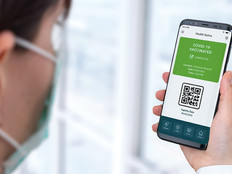How Blockchain Will Transform the Future of Healthcare
Blockchain technology is coming, and it may solve many of the challenges providers experience in healthcare today. But where exactly will it be effective and what use cases should organizations be looking to as they move ahead? Here, there’s much debate.
To help lay the groundwork, a new report from PwC, “A prescription for blockchain and healthcare: Reinvent or be reinvented,” sorts out 4 areas where blockchain in healthcare will have the biggest impact.
MORE FROM HEALTHTECH: Health IT leaders weigh in on the impact of blockchain.
1. Better Manage Medical Supply Chain and Inventory
Pharmaceutical companies, manufacturers, distributors, regulators and just about every part of the healthcare supply chain could benefit from the transaction tracking blockchain offers.
“Each time a company entered into a transaction with another company in the supply chain, that transaction would be recorded and validated on the blockchain. This would simplify the transfer of data and allow product recipients to validate their provenance with greater certainty. It would also significantly simplify transaction reconciliations and data transfers,” the report notes.
This would also simplify recalls for regulators and suppliers.
Moreover, blockchain allows all involved to “agree on a history,” Gus Vlahos, a CDW director of healthcare sales wrote in a recent blog post. That agreement, in turn, could “ensure the integrity of a supply chain against fake, falsified or substandard medications.”
2. Streamline Enrollment, Payment and Contract Data
Before a physician can officially join an office, network or hospital, the organization must confirm credentials like education, licensing and more. As it stands, it takes 120 days to transfer physician data, on average. Blockchain could change that.
“A blockchain-enabled system would permit data relevant to the provider and payer credentialing process to be shared and updated in real time. Processes that take weeks or months could be accomplished in days,” the PwC report notes.
Back-office functions and payments could be managed similarly. Contracts and payments are now checked manually in a long process, but blockchain transactions could be coded into smart contracts, with information stored on blockchain. This would ease the time it takes to make and audit payments and cut back on contract fulfillment time and fraud, the report finds.
3. Manage, Collect and Exchange Patient Data Seamlessly
With patient data currently spread across disparate systems and rarely available in a centralized location, one of the largest issues plaguing the healthcare industry today is how to best aggregate and manage patient data.
Blockchain can help by “allowing for health data to be pooled together and distributed to necessary entities while allowing ownership of the data by patients,” the report notes.
4. Track Risk and Regulatory Compliance
Ensuring and tracking compliance is a constant headache for providers. Blockchain can simplify the quest for compliance and documentation by “allowing companies to more easily keep track of product recalls, audits, tracking product distributions against ethical requirements, and credentialing,” the report notes. And when reporting is necessary, companies can use smart contract logic to “ensure certain actions trigger necessary reporting” based on the data stored in the blockchain.
What It Takes to Implement Blockchain in Healthcare
With these examples in mind, how should healthcare stakeholders begin implementing blockchain? The use of the tech needs to be part of an overall technology strategy, the report authors urge.
“Companies shouldn’t just have a hammer — blockchain — and be in search of a nail. They should give ample thought to the motivation behind an implementation,” the authors say.
A good place to start might be to ask what the “smallest, clearest case for a blockchain” might be for a company, then work from there. And when piloting the technology, it’s critically important to think about the ecosystem in which it will function and consider regulations, infrastructure and other stakeholders along the way.
“The introduction of blockchain technology into the healthcare industry won’t occur overnight, nor will many of its benefits be immediately realizable. Rather, major transformations begin with small steps,” the report authors note.










